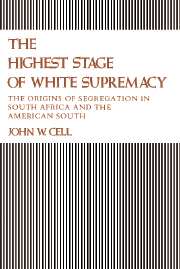Book contents
- Front Matter
- Contents
- Preface
- 1 The Problem of Segregation
- 2 Contemporary Perspectives
- 3 Recent Interpretations of the Origins of Segregation in South Africa
- 4 The Origins of Segregation in the American South: The Woodward Thesis and Its Critics
- 5 The South Makes Segregation: The Economic Interpretation
- 6 The South Makes Segregation: The Social Interpretation
- 7 A Note on Southern Moderates and Segregation
- 8 South Africa Makes Segregation
- 9 Conclusion: Reactions to Segregation
- Notes
- Index
3 - Recent Interpretations of the Origins of Segregation in South Africa
Published online by Cambridge University Press: 22 September 2009
- Front Matter
- Contents
- Preface
- 1 The Problem of Segregation
- 2 Contemporary Perspectives
- 3 Recent Interpretations of the Origins of Segregation in South Africa
- 4 The Origins of Segregation in the American South: The Woodward Thesis and Its Critics
- 5 The South Makes Segregation: The Economic Interpretation
- 6 The South Makes Segregation: The Social Interpretation
- 7 A Note on Southern Moderates and Segregation
- 8 South Africa Makes Segregation
- 9 Conclusion: Reactions to Segregation
- Notes
- Index
Summary
In 1903 the widely recognized leader of the defeated but still unbowed Afrikaner people, Louis Botha – general during the Boer War, future prime minister of the Union, and South Africa's Robert E. Lee – appeared before the Transvaal Labour Commission. That body had been convened by the British high commissioner, Sir Alfred Milner, to investigate the causes and consequences of a widespread, prolonged labor shortage that was seriously undermining the postwar rebuilding of the region's economy. Africans were staying at home in large numbers, somehow contriving to support their families on their small plots, unwilling to come out to work for the reduced level of wages that mining magnates, industrialists, large farmers, and government officials all agreed “the country” in such straitened circumstances could afford to pay. In effect – and Afro-Americans from afar envied their ability to assert their economic independence – Africans were mounting a successful general strike. The Labour Commission was charged with deciding whether southern Africa's supply of labor was or could be equal to the demand and with determining whether, after all, some extraordinary measure, such as the importation of indentured Chinese coolies, might not be essential.
A large Afrikaner farmer himself, General Botha spoke for his class as well as for his people. Like mining and railroad men, he said, farmers were crying out desperately for labor, at wages they could afford to pay. Without it they must go under. But, he believed, there was no need to go outside for it.
- Type
- Chapter
- Information
- The Highest Stage of White Supremacy , pp. 46 - 81Publisher: Cambridge University PressPrint publication year: 1982



